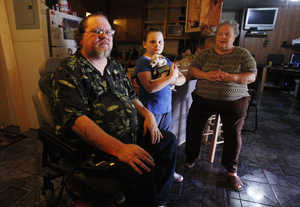skip to main |
skip to sidebar

From
The Wichita Eagle:
Beset by a nerve disorder brought on by diabetes, Michael Lentz (pictured) can't drive, work or walk more than a few steps. But with some assistance from the state, he is able to home-school his 9-year-old daughter, Mariah.
"My daughter needs a little extra help sometimes," he said. "We set up a little classroom for her here. She's doing better now than she did in school last year."
But hundreds of other Kansans with disabilities aren't as fortunate as Lentz.
With the state facing ongoing budget problems, the waiting list for services for people with physical disabilities has grown from zero to 1,382 in the last 10 months.
Lentz receives assistance to pay for what the state calls "home- and community-based services."
It allowed him to hire an aide to help him with meals, laundry and light cleaning so he can live at home. It also allows him to pay his mother for providing him with transportation.
It's the dream of just about all people with disabilities — to be able to live in their own home and be as productive as their condition allows.
"It's been a blessing," Lentz said. "It makes it possible to get what I need."
Those who are getting off the waiting list and into services now have been waiting since the beginning of January, said Jody Chaprowski, senior case manager for the Independent Living Resource Center in Wichita.
"We have case managers that are going out daily and go to these people's homes," she said. "We get their hopes up for a split second saying, 'Here, you're eligible.' And we crush them immediately by saying 'We have no idea when we can help you.' And there's not a worse feeling that we can give to these people."
She said the waiting is hard for disabled people and for those trying to help them.
"We, daily, take calls all day long from people on this list — you know, "Where am I at on the list?' 'What's happening?'
"They're crying ... 'But you don't understand, I have (multiple sclerosis),' or 'you don't understand, I have other disabilities or other illnesses.' We just feel we have no answers for them."
Answers appear to be in short supply at the state level as well.
On Tuesday, eight state lawmakers attended a meeting at the resource center, where people with disabilities told their personal stories and pleaded for help. Lawmakers were sympathetic, but predicted hard times to come.
"I hate to speak for my colleagues, but ... none of us have an answer for the problem that you put on the table today," said Rep. Jim Ward, D-Wichita. "None of us have an answer where we can say we can fix this.
"We don't have the money to deal with those lists right now. And in two weeks the (state revenue) numbers are going to come in and they're not going to be good. They're going to be not as bad as last year, which is good news, but they're going to be bad."
Ward said he'll fight against further cuts in disability services because that sector took significant cuts already in this year's budget. And he urged people with disabilities to fight for funding when the legislative session begins in January.
"Though we may not win what we think a win is, we can improve it," he said. "And every year we improve, we get closer to that goal."
After the meeting, a frustrated Rep. Nile Dillmore, D-Wichita, said the underlying problem is that the majority of legislators are focused mainly on tax cuts, which helps them win re-election.
He said that if lawmakers had delayed implementation on phasing out estate and corporate franchise taxes — tax cuts approved during better economic times — the state would have been able to fund the needs of disabled people and then some.
Instead, lawmakers passed more tax cuts and the waiting lists for services got longer, he said.
"Everything they (disabled people and their advocates) say is absolutely, logically true," Dillmore said. "Every rational person sees it (waiting list reduction) has to be done. And yet we walk away from it year after year."
In this year's session, the Legislature made little if any movement toward resolving a quirk in the law that disabled people and their advocates say is at the heart of the problem.
Under federal law, nursing-home care is considered an entitlement. Home- and community-based services — though usually much less expensive than nursing care — are considered an option, subject to available state funding.
A pilot program by Vermont showed that when people with disabilities were given a choice between nursing homes and home-care services, they picked home care in droves.
That freed up $80 million in government funding, allowing the state to serve 1,600 more people for the money it was already spending.
Republican Rep. Mario Goico and Democratic Rep. Delia Garcia, both of Wichita, said it may be time for Kansas to consider such a change.
"We probably should look at other states like Vermont, see what they've accomplished and if we can implement some of these programs in Kansas," Goico said.
 From The Wichita Eagle:
From The Wichita Eagle:
